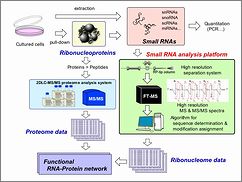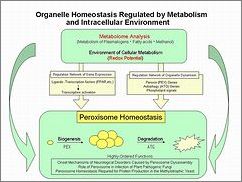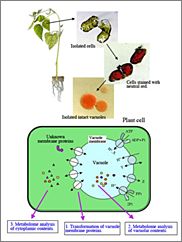2nd,2006 ◆To 1st,2005 ◆To 3rd,2007
- Elucidation of the significance of phospholipids molecular species in biological membranes
 Hiroyuki Arai
Hiroyuki Arai
(Professor, University of Tokyo)
- It is well known that phospholipids present in biological membranes consist of various molecular species with different fatty acyl chains. However, the physiological significance of individual phospholipid and the molecular mechanisms of their formation are not fully elucidated. In this project, we utilize C. elegans genetics and mass spectrometry techniques to identify the enzymes for the formation of phospholipids molecular species and to isolate the membrane proteins requiring phospholipids with very long polyunsaturated fatty acids for their functions.
Main Research Collaborators list
| Keiko Gengyo-Ando | Assistant to Professor,Department of Physiology,Tokyo Women's Medical College |
- Development of mass spectrometry-based analytical platform of small RNAs
 Toshiaki Isobe
Toshiaki Isobe
(Professor, Tokyo Metropolitan University)- Recent genetic and biochemical evidence reveals important regulatory roles of diverse types of small RNA and protein complexes in various biological events. In this study, we will develop mass spectrometry-based technologies that offer sensitive and efficient solutions to analysis of the sequence, structure, modification and composition of small RNAs. Final goal of this study is to integrate these technologies with proteomics and allows comprehensive analysis of functional networks of ribonucleoproteome in a cell.

Main Research Collaborators list
| Nobuhiro Takahashi | Professor,Department of Applied Biological Science,Tokyo University of Agriculture & Technology |
| Hiroshi Nakayama | Chief Scientist,Advanced Development and Supporting Center, RIKEN |
- The study of novel mechanism governning the energy metabolism of animals
 Yo-ichi Nabeshima
Yo-ichi Nabeshima
(Professor, Kyoto University)
- The energy metabolism in animals is regulated by the coordination of multistage events, i.e. intestinal uptake of nutrients, their metabolism in the body, and inter- and intra-cellular signaling generated by those metabolites. Beta-Klotho we identified is estimated to be an important regulator of energy metabolism. Our final goal is to clarify the molecular function of beta-Klotho and to expand our comprehensive understanding of the energy metabolism. As energy metabolism forms the background of obesity, aging and metabolic syndromes, our results may contribute to the clinical application of these diseases.
- Metabolism-based Regulation of Organelle Homeostasis and Cell Function
 Yukio Fujiki
Yukio Fujiki
(Professor, Kyusyu University)- Peroxisome functions in numerous essential metabolic pathways such as the synthesis of ether-lipid plasmalogens and is involved in human neurological disorders and the production of many useful proteins in yeast systems. We delineate the mechanisms underlying the homeostasis, biogenesis and degradation, of peroxisome as a model organelle and metabolic disorders caused by its homeostasis dysregulation, by investigating the dynamism of molecular network regulated by the metabolism. We also establish the basic techniques applicable to developing the diagnostic as well as therapeutic agents for the neurological disease and producing recombinant proteins and food supply.

Main Research Collaborators list
| Yasuyoshi Sakai | Professor,Division of Applied Life Sciences,Graduate School of Agriculture,Kyoto University |
- Control of plant metabolic system by engineering of vacuolar membrane proteins
 Tetsuro Mimura
Tetsuro Mimura
(Professor, Kobe University)- The vacuole is the largest organelle in plants cells and occupies most of the cell volume. Vacuoles are indispensable for maintaining the homeostasis of the cellular environment and metabolic activity. Communication between the vacuole and the rest of the cell occurs across the vacuolar membrane, in which is embedded a multitude of proteins, most of which are expected to be involved in transport of molecules into and from the vacuole. In the present study, we will transform vacuolar membrane proteins, and analyze the changes in metabolites both in the vacuole and in the cytoplasm. In this way we hope to identify the role of vacuolar membrane proteins in regulating cellular metabolism through transport-related changes in metabolite levels. The modification of the vacuolar membrane transporters may enable the new possibility for the production of useful materials.

Main Research Collaborators list
| Mami Yamazaki | Associate Professor,Graduate School of Pharmaceutical Sciences ,Chiba University |
| Yuko Sugiyama | University of Hyogo,School of Science and Environment,Research Associate |
| Koh Aoki | Researcher,Laboratory for Plant Biotechnology,Kazusa DNA Research Institute |